|
|
|
Sort Order |
|
|
|
Items / Page
|
|
|
|
|
|
|
| Srl | Item |
| 1 |
ID:
151556
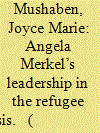

|
|
|
|
|
| Summary/Abstract |
“What Merkel’s critics underestimate is the extent to which her proactive policies of the past decade encouraging integration and ‘intercultural opening’ have produced an even bigger paradigm shift...”
|
|
|
|
|
|
|
|
|
|
|
|
|
|
|
|
| 2 |
ID:
141028
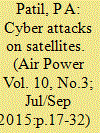

|
|
|
| 3 |
ID:
142343
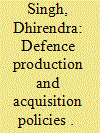

|
|
|
| 4 |
ID:
151895


|
|
|
|
|
| Summary/Abstract |
Nuclear arms control needs a new paradigm. The current approach, focused on deployed strategic nuclear “delivery vehicles”—long-range bombers, nuclear ballistic missile submarines, and intercontinental ballistic missiles (ICBMs), together often referenced as the nuclear triad—was forged during a Cold War standoff between two heavily armed superpower rivals, the United States and the Soviet Union.
|
|
|
|
|
|
|
|
|
|
|
|
|
|
|
|
| 5 |
ID:
145380
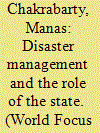

|
|
|
|
|
| Summary/Abstract |
Natural disasters hit at all in the society without any discrimination, rich and poor. But in reality, it is the poor who are the worst sufferers. One of the most important tasks before us is to introduce a culture of prevention in disaster managers and all communities at all levels. The culture must be disseminated so that all people in the society can become alert and become aware so that they can take some preventive measures in case of an emergency or before the disaster strikes. In this regard, early warning and conscious developmental planning are key elements to preventive planning regarding disaster. In India, now we experience a paradigm shift from post disaster response mechanism to pre disaster prevention, preparedness and mitigation strategy.
|
|
|
|
|
|
|
|
|
|
|
|
|
|
|
|
| 6 |
ID:
133677


|
|
|
|
|
| Publication |
2014.
|
| Summary/Abstract |
Growing concerns about the slow revival of the world economy, volatility in oil prices, overcapacity in shipping and fierce competition is denting profits in the shipping industry. On the other hand, emergence of greenhouse gas emissions and pollution control regimes at sea is forcing ship owners to make expensive technical modifications onboard ships, which are further driving up the costs of operations. In such a rapidly changing scenario, there is a need for a long-term vision for transitioning to an era of sustainability in the international shipping industry. The paper commences with a discussion on the concept of sustainability as applicable to the shipping industry and highlights the recent developments in the maritime domain, which pose significant environmental and economic challenges for the shipping industry. It identifies the emerging trends in the shipping industry and argues that these challenges also present a window of opportunity for the industry, for undertaking a paradigm shift towards sustainable shipping. It further explores the transition pathways and presents various options that can be implemented in the shipping industry, which will aid its transition towards sustainability. Using a case study, the paper highlights the key characteristics of sustainable shipping and briefly discusses the Indian maritime scene before concluding that the adaptability of the world shipping industry to adopt the practices of sustainability is fundamental to its survivability in forthcoming decades.
|
|
|
|
|
|
|
|
|
|
|
|
|
|
|
|
| 7 |
ID:
109119
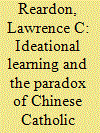

|
|
|
|
|
| Publication |
2011.
|
| Summary/Abstract |
During the 1980s, Chinese policy elites underwent a process of complex learning in economic policy that resulted in a shift from a revolutionary to a techno-economic paradigm that greatly reduced the control of the Chinese Communist Party over the economy. Spillover from the sectoral paradigm shift affected other policy sectors, which forced policy elites to experiment with religious policies that would complement the new economic paradigm. This experimentation fostered the growth of a civil society that could assume the social responsibilities cast off by the reforming state-owned enterprises. However, the experimentation also empowered distributional coalitions such as the Falungong, which threatened the party's control. Policy elites thus implemented adaptations of religious policies formulated under the revolutionary paradigm. The study concludes that the current conflict between the Vatican and Beijing resembles an iterated prisoner's dilemma and that the conflict will continue until Chinese policy elites realize that the failure of religious policy adaptations threaten the long-term goals of the techno-economic paradigm.
|
|
|
|
|
|
|
|
|
|
|
|
|
|
|
|
| 8 |
ID:
141362


|
|
|
|
|
| Summary/Abstract |
There has been a clear paradigm shift in Indo-Bangladesh relations over the past few years, as now exemplified and concretised by the agreements signed during Prime Minister Modi’s visit to Dhaka in June 2015. As Prime Minister Sheikh Hasina said some time ago, it is the season of friendship in Indo-Bangladesh relations. It remains now to build further on the foundation that has been laid.
|
|
|
|
|
|
|
|
|
|
|
|
|
|
|
|
| 9 |
ID:
140337
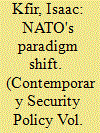

|
|
|
|
|
| Summary/Abstract |
Although recent years have seen more talk about Article 5 and the need for NATO to stand up to an expansive Russia, NATO states are unlikely to engage in a new Cold War with Russia. Instead the alliance continues to explore its agenda in the post-Afghanistan and post-Crimea period. One answer to these tensions is to develop an agenda stressing human security to counter the pervasive threats of regional instability and terrorism. After reviewing the alliance's Military Concept Against Terrorism (MCAT), the deliberations of the 2012 Chicago and 2014 Wales Summits, and the European Union's Common Defence and Security Policy (CSDP), this article explores two propositions. First, that the vacillating commitment of alliance members who chose to address security issues through EU mechanisms or optional coalitions of the willing threatens NATO's relevance. If NATO's members are unclear about the alliance's agenda and identity, others cannot know what the alliance is willing to do to protect its interests. Second, by developing Military Concept against Terrorism and Smart Defence along a human security framework coupled with maritime operations would enable the alliance to better satisfy the needs of its European members, allowing them to employ NATO to support the EU's Common Defence and Security Policy, and ensure a continued reliance on NATO. As one area where there is a consensus between NATO's European members and the USA, counterterrorism is the most promising field that the alliance can focus on. NATO, therefore, should position itself as a key counterterrorism force, albeit one that is not strictly kinetic.
|
|
|
|
|
|
|
|
|
|
|
|
|
|
|
|
| 10 |
ID:
139317
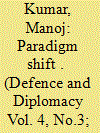

|
|
|
| 11 |
ID:
165833
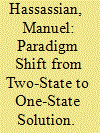

|
|
|
|
|
| Summary/Abstract |
With the one-state solution emerging as an alternative with fewer pros than cons, the Oslo Accords need to be reframed and expanded, and a mutually accepted political/ economic framework developed, if the two-state solution is to be revived.
|
|
|
|
|
|
|
|
|
|
|
|
|
|
|
|
| 12 |
ID:
131007
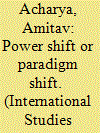

|
|
|
|
|
| Publication |
2014.
|
| Summary/Abstract |
This essay proposes a new theoretical framework for analyzing the rise of China and its impact on Asian security order. While the rise of China is reshaping Asia's military balance, the region has also witnessed equally important and longer-term changes, especially economic interdependence, multilateral institutions and domestic politics. The implications of these changes are not fully accounted for by the different types of security orders proposed by analysts to describe the implications of China's rise, such as anarchy, hierarchy, hegemony, concert, and community. This essay presents an alternative conceptualization of Asian security order, termed consociational security order (CSO) that draws from different theoretical lenses: defensive realism, institutionalism, and especially consociational theory in comparative politics. Specifying the conditions that make a CSO stable or unstable, the essay then examines the extent to which these conditions can be found in Asia today. Aside from offering a distinctive framework for analyzing China's rise, the CSO framework also offers an analytic device for policymakers and analysts in judging trends and directions in Asian security.
|
|
|
|
|
|
|
|
|
|
|
|
|
|
|
|
| 13 |
ID:
170415
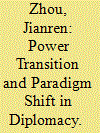

|
|
|
|
|
| Summary/Abstract |
The rise of China is one of the most notable events in the early 21st century. The strategic impacts of its rise and interactions between the hegemonic power and the rising power have become focal points for scholars in the field of international relations. This article uses prospect theory, power transition theory, and nuclear deterrence theory as the basis for constructing a theory of strategic competition to explain the relationship between the hegemonic power and the rising power, and the strategic interactions between them during the power transition process. This new theory of strategic competition maintains that states take diplomatic actions not just to seek gains, but also to avoid losses. Building upon a critical review and revision of power transition theory, the theory of strategic competition proposes that before the rising power overtakes it, the hegemonic power will take action to avoid incurring losses, and that in response the rising power will passively take action to avoid its own losses. After the rising power has overtaken the hegemonic power, however, it will take action to expand its interests, and the hegemonic power will then passively take action to avoid its own losses. Under the inhibitive influence of nuclear deterrence, strategic competition between the hegemonic power and the rising power is limited to peaceful measures including diplomatic means. This article tests the theory of strategic competition through examining the paradigm shifts in diplomacy of the US and China that have occurred since 2010.
|
|
|
|
|
|
|
|
|
|
|
|
|
|
|
|
| 14 |
ID:
182813
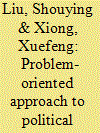

|
|
|
|
|
| Summary/Abstract |
The research paradigm of economics in China is facing great changes. In this article, we analyzed that dilemma of China's current major economics paradigms was inability to analyze and solve the economic problems for the neglect the importance of problem-oriented. The analysis on the two great flourishes of economics shows that theoretical innovation based on the problem-oriented approach in these two periods provide economic explanation for China's historical transformation. Chinese economists should adhere to the problem-oriented approach by generalizing typical facts, analyzing system characteristics, using modern economic analysis tools and producing original economic theories formed with uniqueness refined from major issues.
|
|
|
|
|
|
|
|
|
|
|
|
|
|
|
|
| 15 |
ID:
162579
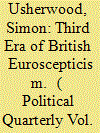

|
|
|
|
|
| Summary/Abstract |
The 2016 referendum marks the start of a new era of euroscepticism in the UK, as the basic parameters of debate have shifted from EU membership to non‐membership as the central working assumption of the political system. This shift radically alters the political opportunity structure for those groups and elements that have developed in the period since the Maastricht treaty, removing the unifying and rallying calls of withdrawal and/or radical change to the EU. The achievement of Brexit thus poses an existential challenge, as individuals either demobilise or divert their political energies into other issues. While a core of activists is likely to remain, their scope for influencing public policy or even public debate will be further weakened by the centrality of creating and managing the UK's relationship with the EU to party political debate for the next decade: precisely because it is so important, we would expect many more voices to lobby government and opposition parties. This all points towards a sharp contraction in the organised base of eurosceptic groups, as well as continuing tensions about what still needs to be done in the grand project of opposing European integration.
|
|
|
|
|
|
|
|
|
|
|
|
|
|
|
|
| 16 |
ID:
084960
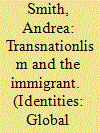

|
|
|
|
|
|
|
|